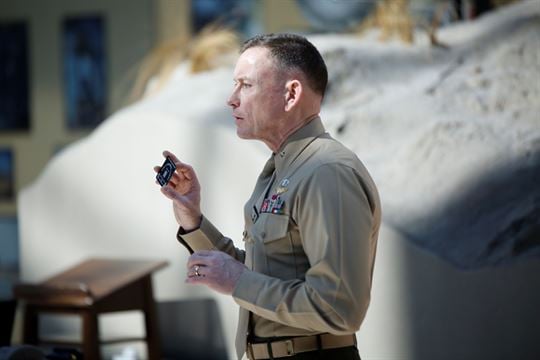
ARLINGTON, VA. — Retired Marine Corps Brig. Gen. Frank Kelley, who commanded Marine Corps Systems Command from 2010 to 2014, will serve as the first-ever deputy assistant secretary of the Navy for unmanned systems.
Navy Secretary Ray Mabus announced Kelley’s selection today at Association for Unmanned Vehicle Systems International’s (AUVSI) annual Unmanned Systems Defense event.
In June, Mabus announced that Rear Adm. Robert Girrier, a surface warfare officer who had been serving as deputy commander of U.S. Pacific Fleet, would become the first-ever director of unmanned weapon systems (OPNAV N99). Girrier and Kelley will now work hand-in-hand to develop and field unmanned systems for future naval operations across all domains and warfare areas. Girrier “will be responsible for the rapid development, prototyping and demonstration of our Navy’s unmanned warfare systems,” Mabus said, while Kelley will “create and implement a strategy for development of this technology that links all domains.”
“Unmanned systems are inherently different from their manned counterparts,” Mabus said in his speech.
“Policies and procedures designed to ensure safety of manned systems must not be allowed to impede the design, development, deployment, testing and evaluation of unmanned systems. We must continue to be leaders in this emerging capability.”
“My goal in creating the DASN for Unmanned Systems was to streamline our current programs and drive a strategy for development that is deliberate and thoughtful,” Mabus continued.
“Currently, our various communities – air, sea, undersea and ground – are all doing incredible work on their unmanned systems and integrating them into the existing architecture within their own framework, but as this technology becomes more complex and widespread, ensuring we have a cohesive management function is critical to maintaining our superiority across all domains, and possibly even multiple domains.”
Now the new DASN and the N99 will be responsible for developing requirements and policy for the Navy’s emerging unmanned weapon systems and take over development of some of the new systems like the Unmanned CarrierLaunched Surveillance and Strike (UCLASS) unmanned aerial vehicle (UAV) and the Large Diameter Unmanned Underwater Vehicle (LDUUV) for use in the Navy’s fleet of nuclear submarine.
A 1983 graduate of University of Notre Dame, Kelley became an EA-6B Prowler pilot and reported to Marine Tactical Electronic Warfare Squadron 2 (VMAQ-2). After serving the Prowler program early in his career as Electronic Warfare Branch Head at Air Test and Evaluation Squadron FIVE (VX-5), and Avionics Systems Project Officer for the EA-6B at Naval Air Systems Command (NAVAIR), he later turned his attention to unmanned systems. He joined Marine Corps Systems Command (MCSC) as the program manager for unmanned systems. After a stint as military assistant to the assistant secretary of the Navy for research, development and acquisition, Kelley returned to MCSC to serve as program manager for training systems, then chief of staff and eventually commander in July 2010. Kelley retired from the Marine Corps in July 2014.





